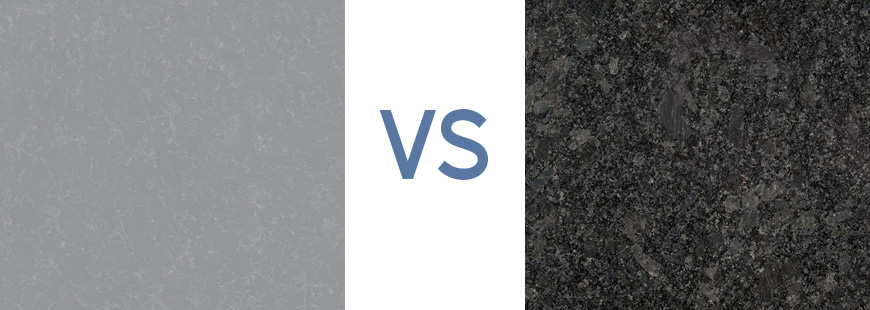Which is the better kitchen countertop option between these two titans?
It depends. Let’s look at some comparisons and see who comes out on top.
WHAT ARE THEY MADE OF?
Granite: 100% natural stone, quarried and cut into slabs to be shaped into kitchen countertops.
Quartz: Engineered stone made from quartz, resins and pigments. Learn more about quartz countertops here.
WINNER: Granite. This is subjective, but if you ask us natural stone is often the better choice.
WHICH LOOKS BETTER, QUARTZ OR GRANITE?
Granite: Unique, natural patterns and colors. No two 2 slabs are the same, making granite countertops well suited for a more organic or rustic look.
Quartz: Usually uniform in color and pattern. Available in a wide ranges and able to mimic marble or granite, making quartz countertops well suited for contemporary kitchens.
WINNER: Depends on the style you’re going for.

WHICH IS MORE DURABLE, QUARTZ OR GRANITE?
Granite: Very hard and heat resistant but can still be chipped or cracked if struck with heavy objects. It’s porous, which means it can stain if not properly sealed.
Quartz: Extremely hard, making it more resistant to chips and cracks than granite but it’s not as heat resistant and can be damaged by hot pans. Non-porous and does not require sealing.
WINNER: Quartz, barely. Granite can be just as durable as quartz with proper sealing and maintenance.
WHICH COSTS MORE, QUARTZ OR GRANITE?
Granite: Price can vary based on color, pattern and where it’s sourced from. Typically costs between $40 - $100+ per square foot installed.
Quartz: Varies by brand and design but is typically a little more expensive than granite, costing between $50 - $120+ per square foot installed.
WINNER: Granite. Cheaper is usually better right?
IS EITHER QUARTZ OR GRANITE BETTER FOR THE ENVIRONMENT?
Granite: Since it’s a natural stone it’s a non-renewable resource and the quarrying / transport process can come with a significant carbon footprint, but its durability and recyclability help make it more sustainable long term.
Quartz: Man made with abundant materials, but the manufacturing process is energy-intensive. Some manufacturers use recycled materials and more sustainable practices.
WINNER: Depends on where / how it’s sourced or made.
WHICH IS EASIER TO MAINTAIN, QUARTZ OR GRANITE?
Granite: Requires sealing (typically on an annual basis). Easy to clean with soap and water.
Quartz: No sealing required. It can stain, however it’s also easy to clean with soap and water.
WINNER: Quartz. While both are low maintenance, the fact that quartz does not require sealing gives it the edge in the maintenance department.
COMPARING QUARTZ COUNTERTOPS VS. GRANITE COUNTERTOPS
To summarize, as you try and decide between quartz and granite for your next kitchen countertops, we recommend asking yourself a few questions:
How much do you want to spend? On average quartz tends to be a bit more expensive than granite.
Do you need your countertops to be a specific color? Since quartz is manmade, it can sometimes be available in a wider variety of colors than granite. Natural stone like granite cannot be pure white, quartz can.
Is maintenance time important to you? Some people prefer granite because it’s natural, but this natural state requires periodic sealing to prevent stains while quartz does not.
Are you shopping local? Some granite can be found right here in Canada at one of our granite quarries (Manitoba in particular is as a popular granite source), while other granite is imported from places like Africa or Italy. Some quartz is produced just “down the road” in London Ontario at the HanStone manufacturing plant, helping to reduce carbon footprint and support the local Ontario economy.
If you’re asking us, we prefer to sell natural stone like granite over quartz.
To get the movement of a quartz product in a natural stone is typically cheaper. Though the whiter/lighter the natural stone the more expensive it typically is.




